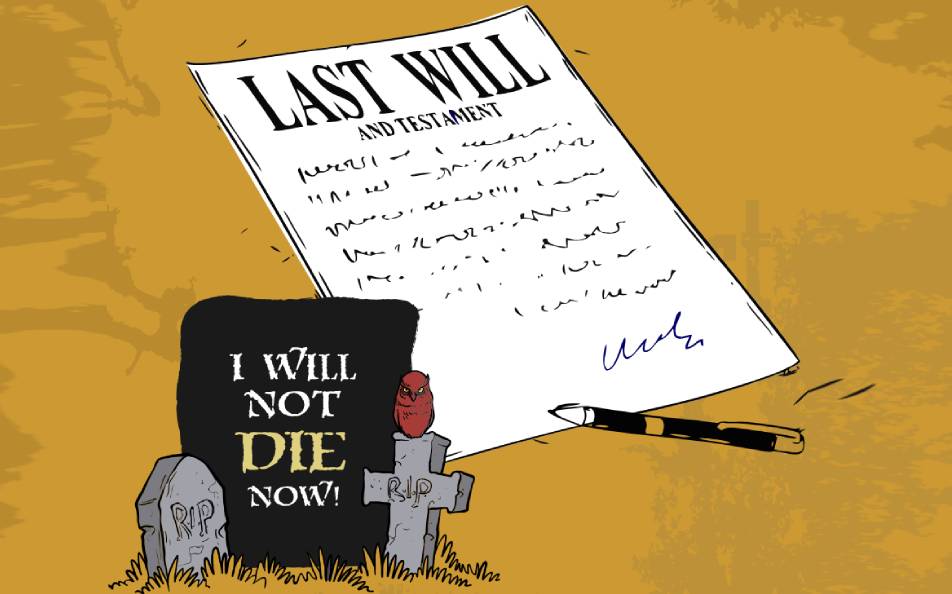In Ghana save in very limited exceptions, lawyers are not allowed to directly advertise for clients. As a result of this, our Firm has devised strategies, to introduce the Firm’s legal products such as being assisted to do one’s will, to existing and potential clients of the Firm.
I was in Court, when my able paralegal Abigail, who keeps the Firm diary to a fault (which has also earned her the additional responsibility of keeping the birthday calender of my loved one’s and sending me reminders to wish them when the day dawns, as believe it or not, I once forgot about my own birthday), called to remind me of my closing transaction meeting with Miss Amanda Colecraft [name has been withheld for confidential purposes].
Without a shadow of doubt, Amanda has achieved so much for herself in her short life on this earth. She was not yet in the 40’s Club, yet she had substantial investments globally and several immovable properties in her name scattered across several continents. Despite all these remarkable achievements, she was still spurring on to dizzy heights with no sign of fatigue or a break.
Luckily the Court I was seated in was full of junior lawyers (it may have been a wrong guess as now with the large numbers being called to the Ghana Bar yearly, not only are there strangers in our midst for those of us who have been around for quite sometime, but one cannot tell whether a fairly new wig signifies seniority or otherwise). I still remained on my feet after the Judge had entered and everyone had gracefully bowed and resumed his or her seat. I had my case called and dealt with on the merits. I rushed into my vehicle and with the assistance of my google map, I navigated the traffic downtown to North Kaneshie, were our office is located, in order to make it in the nick of time for my 10:00 am appointment.
As was to be expected, Amanda had arrived thirty minutes before the slated time. I was greeted by fragrance. After the usual pleasantries, we discussed our last transaction and she informed me that she was flying out of town that evening and she will instruct her relationship manager to pay our invoice together with something extra for everyone.
I expressed my usual thanks. As she rose to go, I asked her if she could spare me ten minutes of her time. She gladly obliged me and resumed her seat. I begun my well rehearsed narrative, giving her ten reasons why it was prudent for her to instruct us to help her prepare her last will and testament.
After I had finished with my narrative, she said: “Lawyer I will not die now. But I have heard you. I will let our discussion engage my mind and when I return, I will put something together for your consideration”. It will interest you to know that the Firm has continued to work for Amanda for three years, one week and two days after that discussion. Almost after every deal we close, Amanda will say: “Lawyer I have not forgotten the will oh. We will do it”. End of discussion.
What is a will, why do people postpone the preparation of their wills and why is it important for people to do a will.
A will is the legal expression of an individuals wishes about the disposition of his or her property after death especially a document by which a person directs his or her estate to be distributed upon death. [2]
Awill includes a codicil and any other testamentary instrument”. [3].
There are a plethora of reasons why people postpone the preparation of their wills and why it is important for one to do his or her will. This list is by no means exhaustive.
- For those who have money in a Bank or their mobile money accounts, confidentiality is at the heart of the banking relationship. Even after death has terminated the relationship. Bank’s and Telecommunication Companies, will not disclose whether a deceased person had an account with them, let alone disclose the amount in the account, unless they have been furnished with an express court order, granting Probate or Letters of Administration to persons specified in the court order.
- Most people in their lifetime remain tight lipped about their financial dealings. Thus it may be difficult for executors and administrators to realise a deceased person’s estate, in order to distribute same. During my ten year stint in the corporate world, we once received notice from a lawyer on behalf of the estate of a deceased person, requesting the Bank to disclose account information. A search in the database of the Bank, revealed nothing. Unknown to us the deceased rather had substantial investments with a subsidiary of the Bank. This discovery was only made after some time has passed, as a result of someone stumbling on information by chance.
- Most people are secretive by nature. There are several stories of people, who have been taken by deceased person’s in their life time to see parcels of land or houses under construction and upon the sudden demise of the deceased, the location of these immovable properties are a maze that people seem not to unravel.
- In our life’s journey, we meet people who help us in diverse ways and we may want to pay them back or recognize their contribution to our lives. A will is the best place to acknowledge or leave bequests and devises, for such people.
- One will want to be specific about how his or her affairs should be conducted after his or her demise. Awill will be the best place to do this.
- There are instances where one will want his or her earthly achievements to outlive him or her. Awill will ensure this is done.
- Largely, we do not know when our earthly life will come to an end. I am told there are instances where doctors due to illness or prophets (usually of doom) can predict when ones earthly life may come to an end. For most people, death tends to spring a surprise on us. All of us will one day go the way of all the earth. Why not prepare for the inevitable? [The Bible says: “Aprudent man foreseeth the evil, and hideth himself: But the simple pass on, and are Punished”.].[4].
- If there are people we truly love and care for, then it is imperative we make adequate provision for them. I witnessed a case where the deceased left behind a spouse who was not working and children in their formative years. Their circumstances were such that the Bank had to exceptionally approve money to pay school fees and stamp duty, pending the issuance of the Letters of Administration. I remember a decided case where a testator did not make provision for his only child who was disabled and dependent on him. An application under section 13(1) of the Wills Act, 1971 (Act 360) failed because the dependant was above eighteen years.[5]
- In our current world setting the contribution and influence of the extended family in one’s life, is either non-existent, or has been whittled down greatly. It is mostly the nuclear family one is born into that one is usually closely associated with. Where one dies intestate, the law preserves one house, household chattels and non commercial vehicles for the surviving spouse and children. [6] For practising Christians, there is a scripture that says “we will receive houses we never worked for” [7] . However in some instances, there are some people belonging to the extended family, who truth be told; do not deserve a pesewa from a person’s estate. A will is the perfect medium to weed out persons from reaping where they have not sown.
- For the two dominant religions in the world by numbers: Christianity and Islam, both the Holy Bible and the Holy Quran, encourages its followers to do their wills.[8].
Not too long ago, I heard (though not verified) that a leading academic scholar on wills, died without leaving behind a will. We may not have the answers to why this was so. I will end by saying, you may not die now. But someday, we will all go the way of all the earth. It is imperative and prudent that we put our lives in order, as much as possible in order to protect our loved ones, leave them with an inheritance and ensure that where appropriate, our earthly achievements live on. Do your will today and now.
REFERENCES
[1] Legal Profession (Professional Conduct and Etiquette) Rules 2020, (LI 2423).
[2] Black’s Law Dictionary. Tenth Edition page 1833.
[3] Section 18 of the Wills Act, 1971 (Act 360).
[4] Proverbs 22:3. Holy Bible KJV.
[5] Humphrey Bonsu and Anor vs Quaynor and Anor [1999-2000] 2 GLR 781.
[6] Sections 3 and 4 of the Intestate Succession Law P.N.D.C.L111.
[7] We will receive houses we never worked for. Deuteronomy 6:10-12 .
[8] In those days Hezekiah became ill and was at the point of death. The prophet Isaiah son of Amoz went to him and said, “This is what the Lord says: Put your house in order, because you are going to die; you will not recover.”
New International Version (NIV) Isaiah 38:1.
In those days Hezekiah became ill and was at the point of death. The prophet Isaiah son of Amoz went to him and said, “This is what the Lord says: Put your house in order, because you are going to die; you will not recover.”
New International Version (NIV) 2nd Kings 20: 1
In the case of a will, it is necessary to prove death of the one who made it.
New International Version (NIV) Hebrews 9:16
Ayan an-Nisa (Women) 4:11. Allah commands you regarding your children: the share of the male will be twice that of the female. If you leave only two or more females, their share is twothirds of the estate. But if there is only one female, her share will be one-half.
Quran 4:11.

